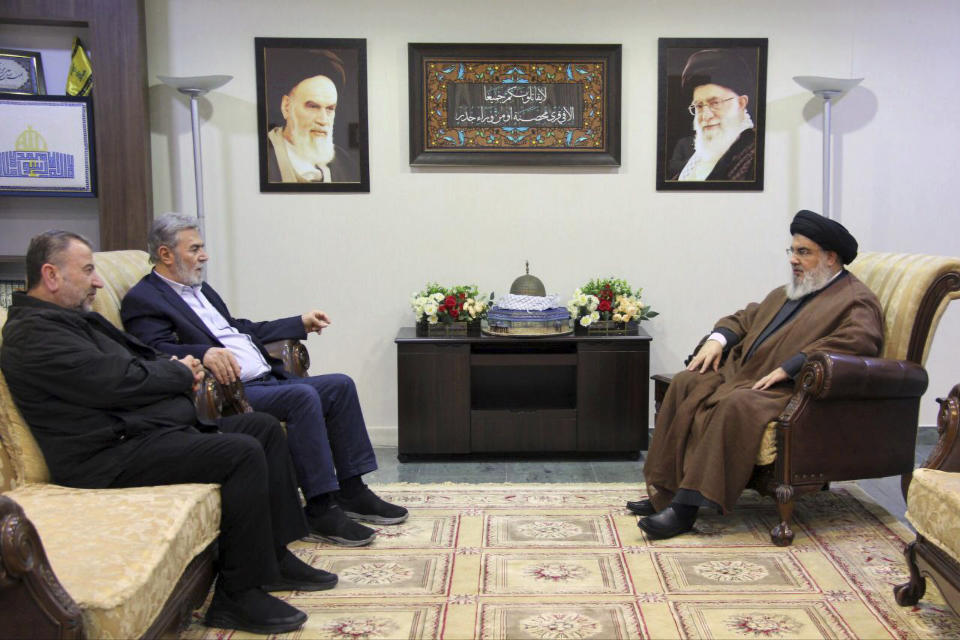Iran’s interests are trumping the Palestinian tragedy. Tehran is staring at the very real prospect of confrontation with the US and Israel — and appears to have quietly decoupled its interests from those of the Palestinians

Lebanon, and perhaps much of the world, breathed a sigh of relief on Friday when Hassan Nasrallah, leader of the powerful Lebanese paramilitary group Hizbollah, finally spoke after four weeks of silence. He sounded like a warrior but didn’t declare war. Lebanon would be spared all-out confrontation with Israel — for now. Many Palestinians felt betrayed, not out of a desire for more conflict, but out of desperation for some back-up amid the devastating Israeli pounding of Gaza. But Nasrallah’s speech was an opening gambit in Tehran’s negotiations with the US for its future place in the region, at a critical juncture not only for the Middle East but for the Islamic Republic.
He mentioned America as much as Israel. Tehran’s top priorities are regime stability, amid domestic political and economic pressures, safeguarding as many of its regional assets as possible and ensuring a smooth succession for the 84-year-old Supreme Leader Ali Khamenei when the time comes. Iran has spent the past 44 years using the Palestinian cause to advance its own interests and enhance its standing with Arabs — it promises to liberate Jerusalem by using proxies to attack Israel far from its own borders, threatens America and generally plays a disruptive role. But the Palestinian element of the strategy appears to have run its course after Hamas’s incursion into Israel on October 7 brought not only retaliatory wrath down upon Gaza, but also the largest US military build-up in the region in many years.
Whether Iran knew of Hamas’s plans or not, it seems not to have anticipated the scale of the operation and the backlash. Tehran is suddenly staring at the very real prospect of direct confrontation with the US and Israel — and it appears to have quietly decoupled its interests from those of the Palestinians. Over the past year, both Nasrallah and the head of Iran’s Quds Force, Esmail Qaani, spoke of co-ordinating Iran’s proxies and unifying fronts against Israel. But in his speech, Nasrallah said the Hamas operation was “the result of a 100 per cent Palestinian decision”. So much for unity.
This of course conveniently helps avoid direct retaliation. But Nasrallah added that those who thought the operation or its timing served Iran’s interests were wrong. Tehran is setting its own course. Last month, Khaled Meshaal, a top Hamas official, complained that the group had expected more support from Hizbollah. But when he spoke, Nasrallah made clear the cavalry wasn’t coming. Iran views Lebanon as a forward defence base with Hizbollah as a key line of defence should the regime come under direct threat — it cannot sacrifice this asset for the Palestinians. Instead, Tehran will increasingly poke America in Syria and Iraq while Hizbollah will do just enough from southern Lebanon to show it is helping Hamas. Sixty-one Hizbollah fighters have already been killed, a high number that has shocked their base, considering the low-intensity warfare on the border. Nasrallah explained it away by claiming that Hizbollah’s tactics are keeping one-third of Israel’s army busy on its northern border.
Nasrallah did warn escalation was possible if the war on Gaza doesn’t stop or if Israel oversteps the rules of engagement with Hizbollah. Nasrallah understands the rhythm of war well. He knows no US administration has ever called on Israel to cease fire within days or even a couple of weeks of a conflict erupting. He chose to speak after four weeks and more than 9,000 Palestinian deaths, his warning conveniently coinciding with President Joe Biden’s first call for “tactical pauses”. Israeli prime minister Benjamin Netanyahu now appears to have tacitly agreed to such pauses. There are now two wars evolving in parallel: the direct one between Hamas and Israel, and the indirect one waged by Tehran. This also means parallel tracks of diplomacy: the first is the immediate urgent task of protecting Palestinian civilians, releasing Israeli hostages, bringing in aid to Gaza and reaching a ceasefire.
Biden has also put the peace process and a two-state solution back on the agenda. But the longer Israel’s attack on Gaza continues, even with pauses, the harder it will be for Arabs to engage and for Saudi Arabia to salvage efforts at normalisation. Iran also benefits from the war dragging on. It may be in a tight spot now but it is adept at turning moments of jeopardy into opportunity. This weekend, Nasrallah will speak again while Iran’s president, Ebrahim Raisi, will make his first visit to Riyadh to attend the summit of the Organisation of Islamic Cooperation. The Saudis should ask Raisi not just what Iran wants but what it’s willing to give up, from Lebanon to Iraq.
- Questions and Answers
- Opinion
- Motivational and Inspiring Story
- Technology
- Live and Let live
- Focus
- Geopolitics
- Military-Arms/Equipment
- Security
- Economy
- Beasts of Nations
- Machine Tools-The “Mother Industry”
- Art
- Causes
- Crafts
- Dance
- Drinks
- Film/Movie
- Fitness
- Food
- Games
- Gardening
- Health
- Home
- Literature
- Music
- Networking
- Other
- Party
- Religion
- Shopping
- Sports
- Theater
- Health and Wellness
- News
- Culture


